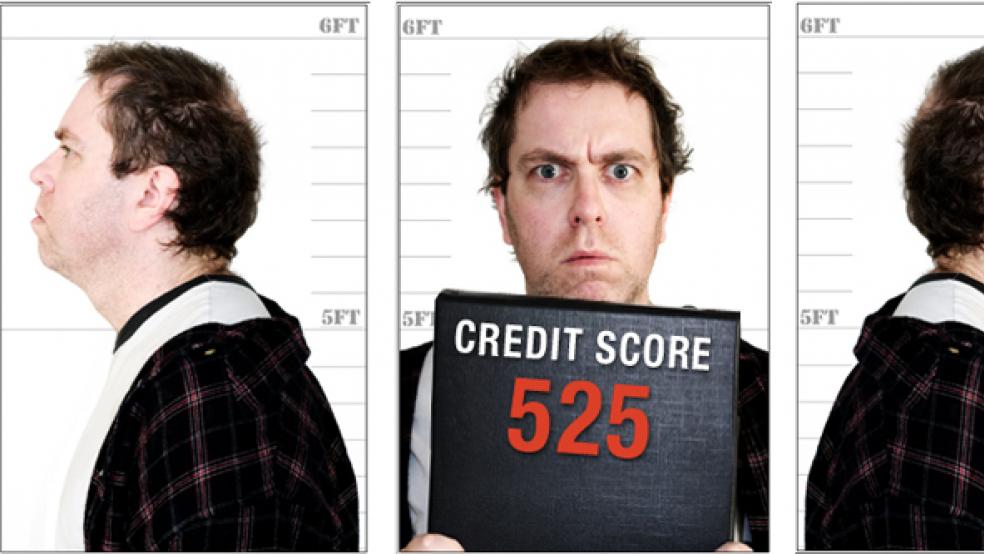It sounds like a perfect solution for businesses — a single data point that lets companies know who is trustworthy and who isn’t. That’s the idea behind credit scores, which were developed in 1958 by FICO Inc. as a way for lenders to determine the likelihood that a customer would repay. Since then, however, the use of the scores has spread well-beyond the financial services industry. And for people emerging from the recession with a low number, that could mean higher interest rates, rejection by a landlord, and an even tougher time finding a job. Now lawmakers and consumers’ advocates are challenging the widespread use of the numbers.
Thanks to the Great Recession, the number of people with bad credit is larger than ever. The three major credit bureaus (Experian, TransUnion, and Equifax) come up with scores ranging from 300 to 850 by using FICO’s mathematical algorithm to analyze consumers’ credit histories. Currently, more than 25 percent of consumers—43.4 million people — have credit scores below 600, according to the latest data released by FICO, a serious red flag.
Historically, only about 15 percent have such low ratings. Those with sub-600 scores are likely to be rejected by mainstream lenders and insurers, and if they do manage to get approval, they pay much higher interest rates and premiums. Even for consumers with scores in the low-600s, the consequences can be enormous. A borrower in Iowa with a score of 630, for example, would end up paying $52,535 in interest more than a borrower with a credit score of 770 on a $150,000 balance over the course of a 30-year mortgage.
But there also are less obvious consequences, as Alexis Moore, 36, learned the hard way. In 2004, she fled the Sacramento, Calif., apartment that she shared with an abusive boyfriend. That gave him access to her credit cards and other personal information, which he used to steal her identity and go on a $50,000 shopping spree. Within weeks, scores of collection agencies were calling her, and her credit score had plunged from 750 to 587.
Now Moore, who has experience in banking and collections, is having trouble getting a job because of her weak credit. In the past several weeks, she has been turned down for jobs at three banks. In each case, she got a letter telling her that she was rejected because of her credit history, even though she says her credit file includes a note that she was a victim of identity theft.
Good People With Bad CreditBad credit is most often the result of missed or late payments or bills. But consumer advocates say that as in Moore’s case, it can be caused by unexpected adverse circumstances. . Divorce can leave one partner with the unpaid debts of their former spouse. Unpaid medical debts can accumulate because a person lacks health insurance. People targeted for predatory loans during the real estate boom lose homes whose payments they can no longer handle. And research suggests that more than 20 million Americans could have material errors on their credit reports. Those mitigating circumstances, however, often don’t make it into credit checks.
Meanwhile, credit scores are more widely used than ever. As many as 60 percent of employers now run credit checks on at least some applicants—up from 42 percent in 2006 and 25 percent in 1998, according to the Society for Human Resource Management.
Insurers also are increasingly using credit scores to set premiums on auto and home policies. Industry experts say there is a correlation between low credit scores and a high number of claims. A 2007 Federal Trade Commission study on the use of scores in car insurance concluded that “credit-based insurance scores are effective predictors of risk under automobile policies.” And there’s some evidence that companies’ use of scores in setting premium rates is good for consumers, according to Alex Hageli of the Property Casualty Insurers Association of America. He points to a survey by the Arkansas Insurance Department last June that shows approximately 32 percent of policyholders paid less because of scoring, while only about eight percent ended up paying more.
Two of the three major credit bureaus have developed services — Equifax’s Payment Predictor and Experian’s SearchAmerica subsidiary—to help hospitals use credit scores and other data to predict patients’ capacity to pay. SearchAmerica is used by more than 500 hospitals. Suzanne Lestina of the Healthcare Financial Management Association, which represents providers, says the purpose is to help determine early on whether patients have the ability to pay and, where appropriate, help them financially. That’s improved hospital collections—SearchAmerica’s website notes that one hospital used its services to boost payments for emergency room care by 250 percent.
A Downward SpiralBut consumer advocates are challenging the broader uses of credit data. For the long-term unemployed, the use of credit scores in hiring creates a cycle that’s tough to escape. “If you’re out of work for a long time, you have difficulty paying your bills,” says Any Traub, coauthor of a June report from the think tank Demos that calls for reform of the credit reporting industry. “If potential employers are looking at credit scores, how on earth are you going to pay your bills then?”
What’s more, the credit bureaus themselves acknowledge there is no proof of a link between a person’s credit score and their suitability as an employee. “At this point we don’t have any research to show any statistical correlation between what’s in somebody’s credit report and their job performance or their likelihood to commit fraud,” TransUnion representative Eric Rosenberg admitted to Oregon legislators last January.
Governments in four states — Hawaii, Illinois, Oregon, and Washington — have limited the use of credit information in employment, and another 25 states have similar measures pending in the 2011 legislative session. At the federal level, the Equal Employment for All Act, introduced to the U.S. House of Representatives in January by Democrat Steve Cohen of Tennessee, would prohibit the use of consumer credit checks in employment decisions, with a few exceptions.
Hospitals’ use of patients’ credit data has also come under fire. In 2007, James Wilkerson of Petersburg, Va., was rushed to the emergency room of a for-profit hospital with complications from chemotherapy. After he got home, the hospital started calling about his bill -- $28,000 for his four-day stay. Wilkerson said that the hospital, rather than negotiating a payment plan or qualifying him for financial aid, used his credit report to pressure him to charge the bill to a credit card that had a $13,000 available credit limit—the hospital accepted that amount as payment in full, according to Consumer Reports. After Wilkerson and his wife couldn’t keep up with the monthly card payment and the 30 percent interest rate—her $18,000 salary was their only income—they sought legal help.
Manesh Rath, a partner at the Washington D.C., law firm of Keller and Heckman who represents companies in employment cases, says employers are justified in using credit source to get a sense of an applicant’s level of responsibility. “Well-intentioned employers are not looking to screen out good applicants because their credit data have been damaged due to job loss, unexpected financial disasters, or medical issues,” he says. HFMA’s Lestina says hospitals rarely misuse credit-score data. “It doesn’t help anyone to put the patient into debt,” she says.
Critics say both lenders and borrowers would be better off if employers, insurers, landlords and others looked beyond the three-digit numbers to decide who is a bad credit risk. Chris Hogan, who worked as a consumer loan officer and now is a speaker on personal finance for the Dave Ramsey Speakers Group, wants to see a return to underwriters reviewing individual consumer files. But he also has a message for consumers who are worried about their credit scores: borrow less. “Slow down, “ he says. Save up for what ever you want and “pay cash.”
More coverage of personal finance at The Fiscal Times:
Record Numbers Crack Open Retirement Nest Eggs
The Reimbursement Most Taxpayers Miss
Fixing the Mortgage Market Could Hurt Consumers





